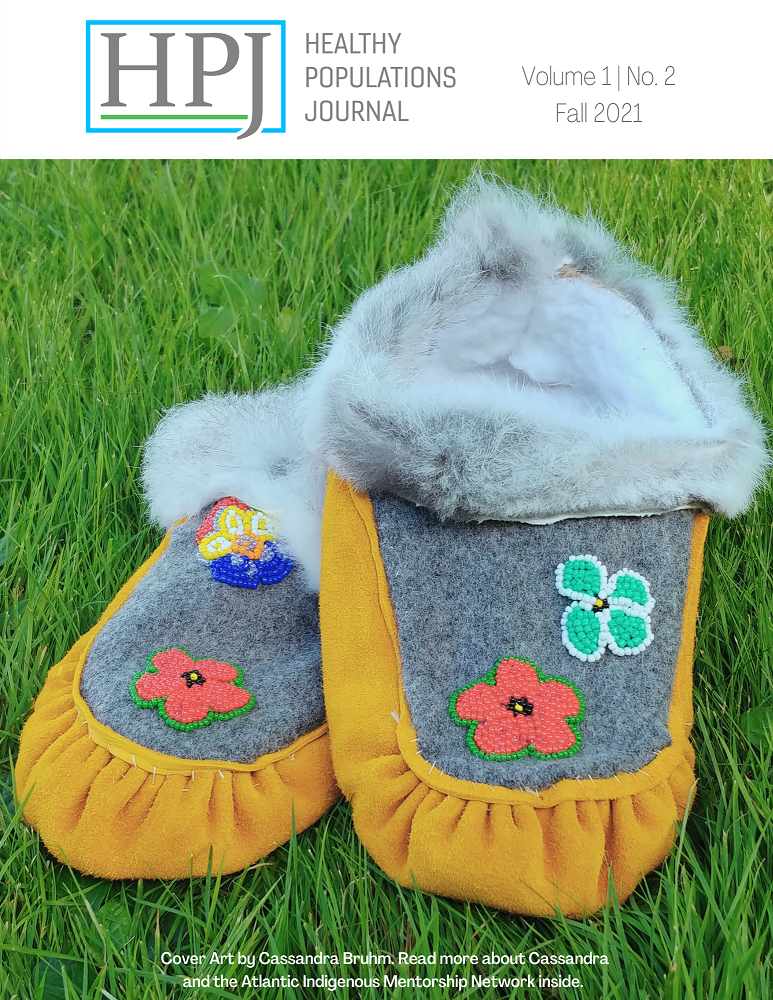Bibliometric analysis of perinatal anxiety and depression from 1920-2020: A protocol
DOI:
https://doi.org/10.15273/hpj.v1i2.11002Resumo
Introduction: From pregnancy to the first year postpartum, both men and women experience significant physical, psychological, and social changes that may increase their risk of a mental illness, including anxiety and depression. There has been significant growth in the frequency of literature around anxiety and depression across the perinatal period over the past decades with variation in definition, measurement outcomes, and populations. To focus future research and identify gaps, it is important to explore patterns and trends in the current literature. Objective: The objective of this bibliometric analysis is to analyze the characteristics and trends in published research on anxiety and depression across the perinatal period from January 1, 1920 to the end of 2020. Inclusion criteria: All published literature in Web of Science on perinatal anxiety and depression from January 1, 1920 to December 31, 2020. Methods: Web of Science will be used to analyze bibliometric information through their built-in analysis feature and citation report that generates a list of leading publications, publication years, authors, source titles, countries/regions, organizations, and research areas. VOSviewer will be used to analyze and visualize the networks of linkages between the identified reports, including bibliometric networks, including co-authorship, co-occurrence, and co-citation, as well as co-occurrence between keywords. Conclusion: This study will provide useful information to guide future work on perinatal anxiety and depression. This bibliometric review will provide an overview of the work to date in perinatal mental health, identify key contributions to the field, and identify knowledge gaps and future directions.
Referências
Ali, E. (2018). Women‘s experiences with postpartum anxiety disorders: A narrative literature review. International Journal of Women‘s Health, 10, 237–249. https://doi.org/10.2147/IJWH.S158621
American Psychiatric Association. (2013). Diagnostic and statistical manual of mental disorders (5th ed.). https://doi.org/10.1176/appi.books.9780890425596
Andersson, L., Sundström-Poromaa, I., Wulff, M., à…ström, M., & Bixo, M. (2006). Depression and anxiety during pregnancy and six months postpartum: A follow-up study. Acta Obstetricia et Gynecologica Scandinavica, 85(8), 937–944. https://doi.org/10.1080/000163406006976522
Bayrampour, H., Tomfohr, L., & Tough, S. (2016). Trajectories of perinatal depressive and anxiety symptoms in a community cohort. Journal of Clinical Psychiatry, 77(11), e1467–e1473. https://doi.org/10.4088/JCP.15m10176
Dennis, C.-L., Falah-Hassani, K., Brown, H. K., & Vigod, S. N. (2016). Identifying women at risk for postpartum anxiety: A prospective population-based study. Acta Psychiatrica Scandinavica, 134(6), 485–493. https://doi.org/10.1111/acps.12648
Donthu, N., Kumar, S., Mukherjee, D., Pandey, N., & Lim, W. M. (2021). How to conduct a bibliometric analysis: An overview and guidelines. Journal of Business Research, 133, 285–296. https://doi.org/10.1016/j.jbusres.2021.04.070
Gauthier, E. (1998). Bibliometric analysis of scientific and technological research: A user‘s guide to the methodology. Statistics Canada. https://www150.statcan.gc.ca/n1/en/pub/88f0006x/88f0006x1998008-eng.pdf?st=ejNrviqh
Lanes, A., Kuk, J. L., & Tamim, H. (2011). Prevalence and characteristics of Postpartum Depression symptomatology among Canadian women: A cross-sectional study. BMC Public Health, 11, Article 302. https://doi.org/10.1186/1471-2458-11-302
Leach, L. S., Poyser, C., & Fairweather-schmidt, K. (2017). Maternal perinatal anxiety: A review of prevalence and correlates. Clinical Psychologist, 21(1), 4–19. https://doi.org/10.1111/cp.12058
Linnenluecke, M. K., Marrone, M., & Singh, A. K. (2020). Conducting systematic literature reviews and bibliometric analyses. Australian Journal of Management, 45(2), 175–194. https://doi.org/10.1177/0312896219877678
Meades, R., & Ayers, S. (2011). Anxiety measures validated in perinatal populations: A systematic review. Journal of Affective Disorders, 133(1–2), 1–15. https://doi.org/10.1016/j.jad.2010.10.009
Moral-Muñoz, J. A., Herrera-Viedma, E., Santisteban-Espejo, A., & Cobo, M. J. (2020). Software tools for conducting bibliometric analysis in science: An up-to-date review. Profesional de la Información, 29(1), Article e290103. https://doi.org/10.3145/epi.2020.ene.03
Norhayati, M. N., Nik Hazlina, N. H., Asrenee, A. R., & Wan Emilin, W. M. A. (2015). Magnitude and risk factors for postpartum symptoms: A literature review. Journal of Affective Disorders, 175, 34–52. https://doi.org/10.1016/j.jad.2014.12.041
O‘Hara, M. W., & Wisner, K. L. (2014). Perinatal mental illness: Definition, description and aetiology. Best Practice & Research: Clinical Obstetrics & Gynaecology, 28(1), 3–12. https://doi.org/10.1016/j.bpobgyn.2013.09.002
Ruiz-Real, J. L., Uribe-Toril, J., Valenciano, J. D. P., & Gázquez-Abad, J. C. (2018). Worldwide research on circular economy and environment: A bibliometric analysis. International Journal of Environmental Research and Public Health, 15(12), Article 2699. https://doi.org/10.3390/ijerph15122699
Sinesi, A., Maxwell, M., O‘Carroll, R., & Cheyne, H. (2019). Anxiety scales used in pregnancy: Systemic review. BJPsych Open, 5(1), Article e5. https://doi.org/10.1192/bjo.2018.75
Ströhle, A., Gensichen, J., & Domschke, K. (2018). The diagnosis and treatment of anxiety disorders. Deutsches Ó’rzteblatt International, 115(37), 611–620. https://doi.org/10.3238/arztebl.2018.0611
Ukatu, N., Clare, C. A., & Brulja, M. (2018). Postpartum depression screening tools: A review. Psychosomatics, 59(3), 211–219. https://doi.org/10.1016/j.psym.2017.11.005
van Eck, N. J., & Waltman, L. (2020). VOSviewer Manual version 1.6.16. VOSviewer. https://www.vosviewer.com/download/f-33t2.pdf
Wee, K. Y., Skouteris, H., Pier, C., Richardson, B., & Milgrom, J. (2011). Correlates of ante- and postnatal depression in fathers: A systematic review. Journal of Affective Disorders, 130(3), 358–377. https://doi.org/10.1016/j.jad.2010.06.019


